

Why creative people are different from everyone else. There’s no doubt that creative people are very different from others.
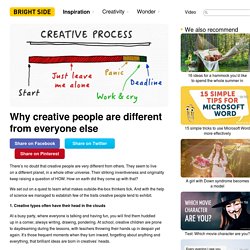
They seem to live on a different planet, in a whole other universe. Their striking inventiveness and originality keep raising a question of HOW. How on earth did they come up with that? We set out on a quest to learn what makes outside-the-box thinkers tick. Outline of thought. Nature of thought[edit] Thought (or thinking) can be described as all of the following: An activity taking place in a: brain – organ that serves as the center of the nervous system in all vertebrate and most invertebrate animals (only a few invertebrates such as sponges, jellyfish, adult sea squirts and starfish do not have a brain).
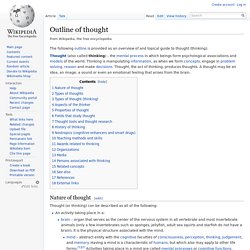
It is the physical structure associated with the mind. mind – abstract entity with the cognitive faculties of consciousness, perception, thinking, judgement, and memory. Having a mind is a characteristic of humans, but which also may apply to other life forms.[1][2] Activities taking place in a mind are called mental processes or cognitive functions.computer (see automated reasoning, below) – general purpose device that can be programmed to carry out a set of arithmetic or logical operations automatically. Types of thoughts[edit] Types of thought (thinking)[edit] Listed below are types of thought, also known as thinking processes. Animal thought[edit] Thinking. The Five Major Theories of Creativity. There are five major theories of creativity each with its own unique viewpoint on what creates creativity in people.
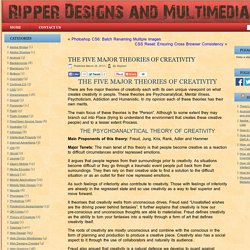
These theories are Psychoanalytical, Mental illness, Psychoticism, Addiction and Humanistic. In my opinion each of these theories has their own merits. The main focus of these theories is the “Person”. Although to some extent they may branch out into Place (trying to understand the environment that creates these creative people) and to a lesser extent Process. A Guide for the Perplexed: Mapping the Meaning of Life and the Four Levels of Being. By Maria Popova How to harness the uniquely human power of “consciousness recoiling upon itself.”
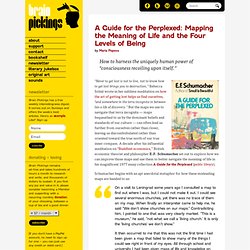
“Never to get lost is not to live, not to know how to get lost brings you to destruction,” Rebecca Solnit wrote in her sublime meditation on how the art of getting lost helps us find ourselves, “and somewhere in the terra incognita in between lies a life of discovery.” But the maps we use to navigate that terra incognita — maps bequeathed to us by the dominant beliefs and standards of our culture — can often lead us further from ourselves rather than closer, leaving us discombobulated rather than oriented toward the true north of our true inner compass. A decade after his influential meditation on “Buddhist economics,” British economic theorist and philosopher E.F. Schumacher set out to explore how we can improve those maps and use them to better navigate the meaning of life in his magnificent 1977 essay collection A Guide for the Perplexed (public library). Why “Psychological Androgyny” Is Essential for Creativity. By Maria Popova “Creative individuals are more likely to have not only the strengths of their own gender but those of the other one, too.”
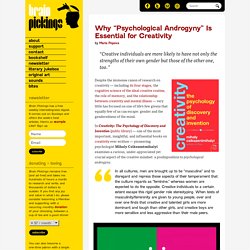
Despite the immense canon of research on creativity — including its four stages, the cognitive science of the ideal creative routine, the role of memory, and the relationship between creativity and mental illness — very little has focused on one of life’s few givens that equally few of us can escape: gender and the genderedness of the mind. In Creativity: The Psychology of Discovery and Invention (public library) — one of the most important, insightful, and influential books on creativity ever written — pioneering psychologist Mihaly Csikszentmihalyi examines a curious, under-appreciated yet crucial aspect of the creative mindset: a predisposition to psychological androgyny.
Illustration by Yang Liu from 'Man Meets Woman,' a pictogram critique of gender stereotypes. Click image for details. Illustration from the 1970 satirical book 'I’m Glad I’m a Boy! Synesthesia and the Poetry of Numbers: Autistic Savant Daniel Tammet on Literature, Math, and Empathy, by Way of Borges. By Maria Popova “Like works of literature, mathematical ideas help expand our circle of empathy, liberating us from the tyranny of a single, parochial point of view.”
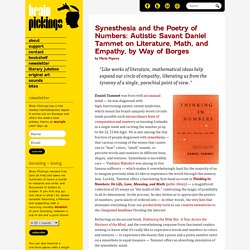
Daniel Tammet was born with an unusual mind — he was diagnosed with high-functioning autistic savant syndrome, which meant his brain’s uniquely wired circuits made possible such extraordinary feats of computation and memory as learning Icelandic in a single week and reciting the number pi up to the 22,514th digit. He is also among the tiny fraction of people diagnosed with synesthesia — that curious crossing of the senses that causes one to “hear” colors, “smell” sounds, or perceive words and numbers in different hues, shapes, and textures. Synesthesia is incredibly rare — Vladimir Nabokov was among its few famous sufferers — which makes it overwhelmingly hard for the majority of us to imagine precisely what it’s like to experience the world through this sensory lens. Imagine. Why Time Slows Down When We’re Afraid, Speeds Up as We Age, and Gets Warped on Vacation. By Maria Popova “Time perception matters because it is the experience of time that roots us in our mental reality.”
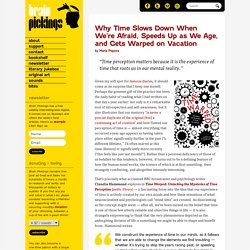
Given my soft spot for famous diaries, it should come as no surprise that I keep one myself. 5 examples of how the languages we speak can affect the way we think. Keith Chen (TED Talk: Could your language affect your ability to save money?)
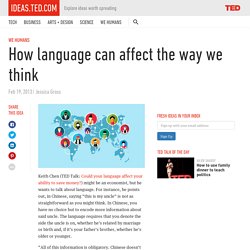
Might be an economist, but he wants to talk about language. For instance, he points out, in Chinese, saying “this is my uncle” is not as straightforward as you might think. In Chinese, you have no choice but to encode more information about said uncle. The language requires that you denote the side the uncle is on, whether he’s related by marriage or birth and, if it’s your father’s brother, whether he’s older or younger. Why We Like the New and Shiny: A History and Future of Neophilia. By Maria Popova What five-year-old Albert Einstein can teach us about serendipity and the filter bubble of information.
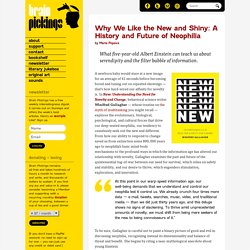
How melancholy expands our capacity for creativity, the best science books of the year, beautifully untranslatable words from around the world & more. Hey Peggy Fleming!
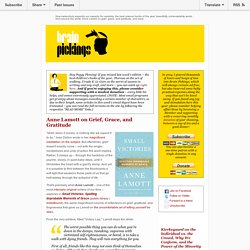
If you missed last week's edition – the best children's books of the year, Thoreau on the art of walking, Ursula K. Le Guin on the secret of success in writing and any craft, and more – you can catch up right here. And if you're enjoying this, please consider supporting with a modest donation – every little bit helps, and comes enormously appreciated. (NOTE: Most email programs get grumpy about messages exceeding a certain number of characters, so due to their length, some articles in this week's email digest have been truncated – you can read the full versions on the site by following the respective "READ MORE" links.) Anne Lamott on Grief, Grace, and Gratitude "Grief, when it comes, is nothing like we expect it to be," Joan Didion wrote in her magnificent meditation on the subject. Why We Have Our Best Ideas in the Shower: The Science of Creativity - - The Buffer Blog. “I’m not really a creative person”, always struck me as an odd sentence.
Could it really be that some of us are born to be more creatively gifted than others? If so, I thought at first, that’s definitely a downer. In school, what was considered “being creative”, like writing or drawing nice pictures was never my strength. It bugged me for a while I have to say. Combinatorial Creativity and the Myth of Originality. Use your head. Author-blog-1.